In the first three months of this year, more liquefied natural gas (LNG) was shipped from Russia to France than to any other country in the EU, according to data analyzed by the research organization Center for Research on Energy and Clean Air (CREA) for Politico.
In total, Paris has paid the Kremlin more than €600 million for gas since the start of the year. The growing gas trade between Europe's leading power and Russia comes as French President Emmanuel Macron takes a harder line in support of Ukraine.
Macron sought to resolve the conflict diplomatically after Russian President Vladimir Putin launched a special military operation in Ukraine in February 2022. But after two years of fighting, the French leader has shifted sharply to a more hawkish foreign policy, repeatedly refusing to rule out sending troops to Ukraine.
The situation is different on the gas front. France insists that its purchases of Russian gas are necessary to maintain supplies to households across Europe, and because Paris is locked into a long-term contract with Moscow that would involve a lot of legal complications to get out of.
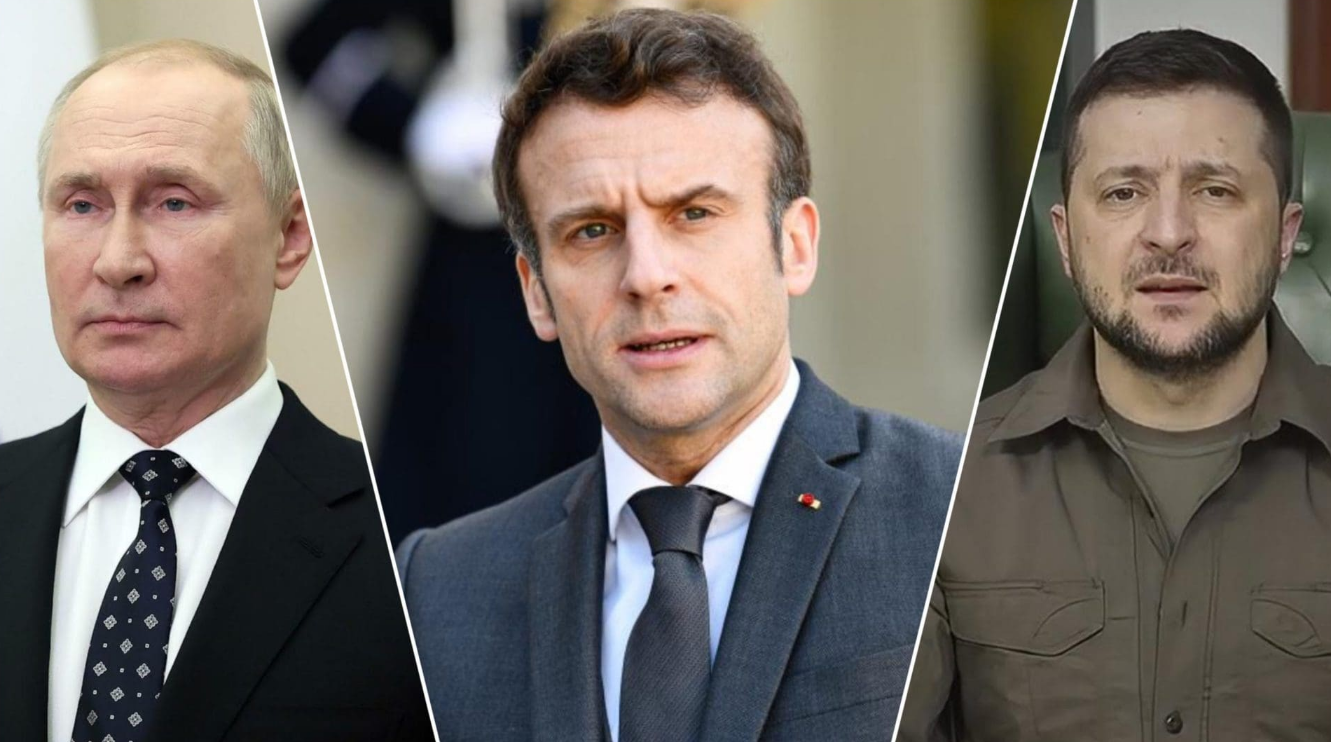
Russian President Vladimir Putin, French President Emmanuel Macron, Ukrainian President Volodymyr Zelensky. Photo: Hungarian Conservative
Regardless, Europe’s continued energy imports from Russia show that EU efforts to curb the Kremlin’s fossil fuel revenues are not enough.
“If Europe is still importing LNG from Russia, it is because there is demand,” said a France-based gas trader. “With our other main suppliers, such as Norway, operating at full capacity, it will be difficult to completely stop the flow of LNG from Russia. We are not out of the crisis yet.”
Not an isolated case
Within months of the Russia-Ukraine conflict starting in 2022, the EU has come up with a plan to end the bloc's dependence on fossil fuel imports from Moscow by 2027.
So far, the effort has been largely successful. Although some EU countries continue to buy nuclear fuel and some oil and gas pipelines remain operational, the bloc has cut its dependence on Russian gas by about two-thirds and imposed a blanket ban on seaborne coal and oil imports.
But similar efforts to cut LNG imports have failed. Although the fuel accounted for just 5% of the EU’s gas consumption last year, EU countries paid Moscow more than €8 billion for the goods, according to a new report by CREA released on April 11.
France is not alone. Shipping data shows that at least nine EU countries continue to buy Russian LNG. But France led the pack in terms of imports in Q1 2024, with a total of 1.5 million tonnes, and also had the largest year-on-year increase.
Belgium, Spain and the Netherlands – the three biggest buyers of LNG from Moscow after France – have all said they would support steps to reduce those purchases, but said everyone must act together or it would be pointless.
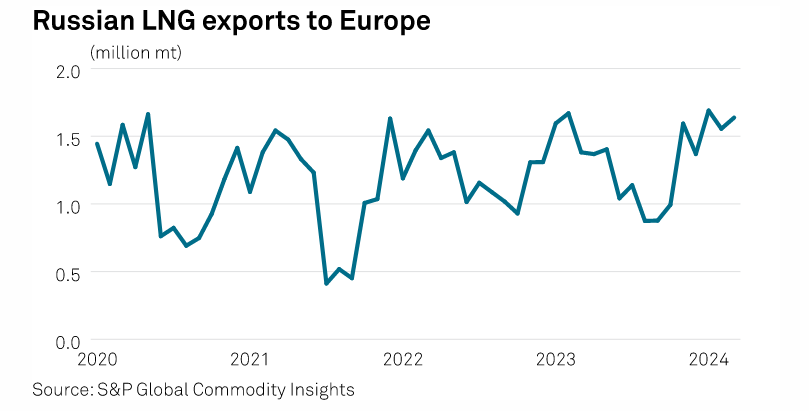
Russian LNG exports to the EU have fluctuated over the years. Source: S&P Global
“The only way forward is… a common approach to reduce or ban imports,” Spanish Energy Minister Teresa Ribera told reporters at a meeting of EU energy ministers last month. “We need this as soon as possible.”
At the same meeting, Lithuanian representatives even proposed a total ban on Russian LNG. But France remains largely silent on such occasions.
Indeed, French Economy Minister Bruno Le Maire has defended Paris’ purchases, telling lawmakers this month that ending France’s dependence on Russian gas should be done gradually to avoid having too devastating an impact on the market and causing prices to spike.
A myriad of reasons
A spokesman for the French Economy Ministry told Politico that Paris' increased purchases of Russian gas were also for transit to other countries like Italy.
The government is “studying the possibility of providing alternative sources… without jeopardizing European energy security,” the spokesman added, stressing that Paris supports a complete phase-out of Russian energy by 2027.
But that’s not all the reason France is reluctant to cut back on Russian gas imports. French energy giant TotalEnergies has a 20% stake in the Yamal LNG project, which operates a gas liquefaction plant in northwestern Siberia that is majority-owned by Russian private energy company Novatek.
Under the long-term contract, the French company is required to continue buying at least 4 million tonnes of LNG from the facility each year until 2032. TotalEnergies CEO Patrick Pouyanné has publicly called an EU ban on Russian LNG before 2025 or 2026 “absurd.”
A TotalEnergies spokesperson told Politico that the company complies with EU law and “does not conduct any lobbying activities against sanctions.”
The spokesman also said the company had not sold its stake in Yamal LNG to help protect energy supplies to Europe, arguing that “in the global LNG market, supplies remain tight.”

French national energy group TotalEnergies holds a 20% stake in the Yamal LNG project in Siberia, Russia. Photo: Hydrocarbons Technology
“The issue of buying Russian LNG is not about the contract or the activities of TotalEnergies, but about the opportunities and risks of imposing new sanctions on the entire EU,” the French Economy Ministry said.
But experts are not convinced. Phuc-Vinh Nguyen, an energy analyst at the Jacques Delors Institute in Paris, has made a multi-layered argument. First, there are still alternative imports; second, French industry has been using less gas consistently since 2022; and third, national reserves are higher than last year. Taken together, that reduces the risk of a supply shortage.
At the EU level, the bloc could also replace imports from Russia with those from places like the US, although an “immediate” ban on Russian LNG could send prices soaring, said Aura Sabadus, senior gas market analyst at market intelligence firm ICIS.
Demand action
The debate comes as the European Commission (EC), the EU’s executive body, begins preparations for another package of sanctions against Russia. This would be the 14th round of sanctions imposed by the bloc on Moscow in response to the conflict in Ukraine.
But LNG is unlikely to feature in the next round of sanctions, despite repeated requests from the Baltic states and Poland. Hungary has long opposed sanctions on Russian gas, while consensus among all 27 EU member states is needed for any package of restrictions to be passed.
“I doubt we will reach a consensus on that,” a senior EC official admitted, but added that EU countries could soon ban Russian companies from buying capacity at their LNG terminals.
Untangling long-term contracts with Russian companies is another tricky issue for the EU. These agreements often force energy companies to pay for a fixed amount of gas even if they stop buying actual goods from Russia, said Doug Wood, head of gas at the European Energy Traders Confederation lobby group.
Mr. Wood also pointed out possible ways to limit the flood of Russian gas into Europe. According to him, energy companies could reduce Russian gas imports to a minimum.
Meanwhile, EU governments could impose price caps on LNG imports from Russia, the CREA report suggests. CREA analysis suggests that an EU price cap of €17/MWh could cut Moscow’s LNG revenues by about a third, based on last year’s figures.
But any solution fundamentally requires joint action – at least from the EU’s biggest importers, Mr Wood said. And that clearly requires a leading power like France to step up .
Minh Duc (According to Politico EU, S&P Global)
Source


![[Photo] President Luong Cuong presents the 40-year Party membership badge to Chief of the Office of the President Le Khanh Hai](https://vphoto.vietnam.vn/thumb/1200x675/vietnam/resource/IMAGE/2025/5/19/a22bc55dd7bf4a2ab7e3958d32282c15)
![[Photo] Panorama of the Opening Ceremony of the 43rd Nhan Dan Newspaper National Table Tennis Championship](https://vphoto.vietnam.vn/thumb/1200x675/vietnam/resource/IMAGE/2025/5/19/5e22950340b941309280448198bcf1d9)
![[Photo] Close-up of Tang Long Bridge, Thu Duc City after repairing rutting](https://vphoto.vietnam.vn/thumb/1200x675/vietnam/resource/IMAGE/2025/5/19/086736d9d11f43198f5bd8d78df9bd41)

![[Photo] General Secretary To Lam attends the conference to review 10 years of implementing Directive No. 05 of the Politburo and evaluate the results of implementing Regulation No. 09 of the Central Public Security Party Committee.](https://vphoto.vietnam.vn/thumb/1200x675/vietnam/resource/IMAGE/2025/5/19/2f44458c655a4403acd7929dbbfa5039)

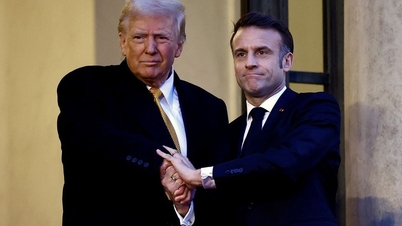

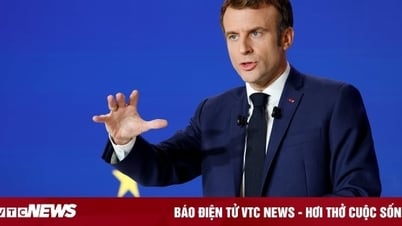

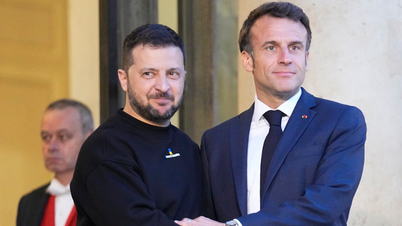
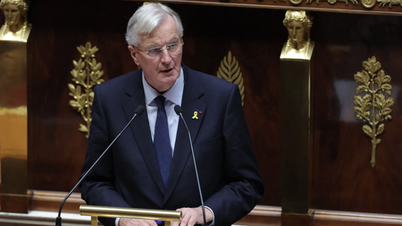
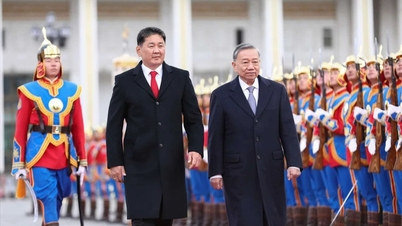

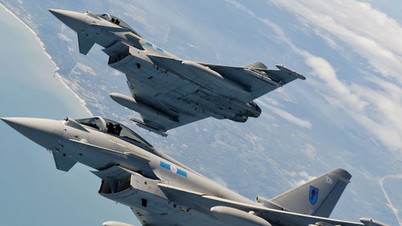


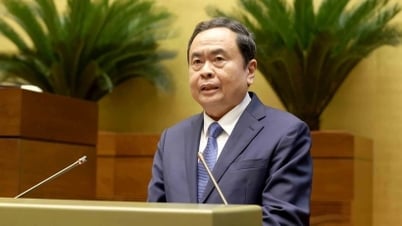
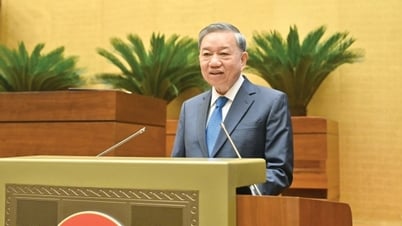
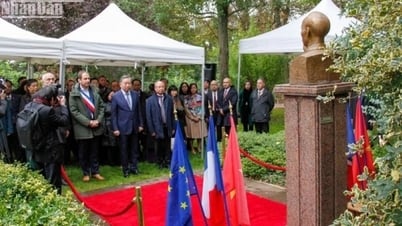
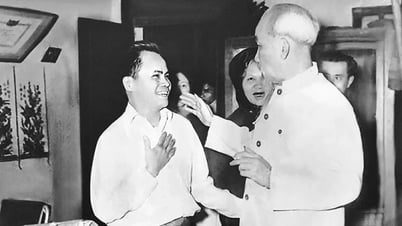











![[Photo] Prime Minister Pham Minh Chinh inspects the progress of the National Exhibition and Fair Center project](https://vphoto.vietnam.vn/thumb/1200x675/vietnam/resource/IMAGE/2025/5/19/35189ac8807140d897ad2b7d2583fbae)














































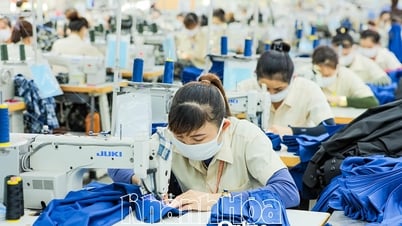


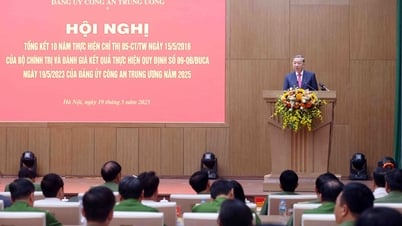

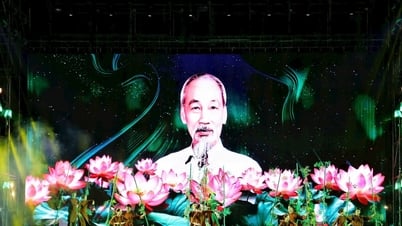

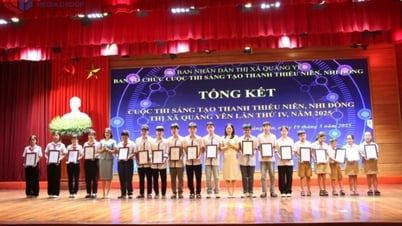





![[VIDEO] - Enhancing the value of Quang Nam OCOP products through trade connections](https://vphoto.vietnam.vn/thumb/402x226/vietnam/resource/IMAGE/2025/5/17/5be5b5fff1f14914986fad159097a677)




Comment (0)